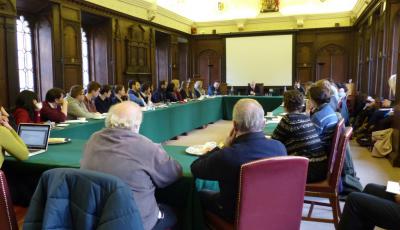To kick off the All Souls Seminars of 2015 we were treated to three academics speaking on the subject of ‘Democratising Punishment’. Dr Christopher Bennett from Sheffield University and Professor Jan de Keijser from Leiden University in the Netherlands joined Oxford Professor Julian Roberts to discuss the role public opinion should have on sentencing. An interesting philosophical debate in itself, this seminar was particularly timely given the recent trend of academics advocating the democratisation of criminal justice. Roberts and Bennett gave brief yet thought-provoking presentations outlining the key parameters and terms of the debate. De Keijser then built on this groundwork, seeking to undermine the empirical validity of a popular instrumental argument for directly incorporating the public’s views in sentencing.

Advocating direct democratisation, Roberts informed us, makes one a “demophile”, whilst “demoskeptics” believe that incorporating public opinion might be favourable, but that it should only ever play an indirect role. However, Bennett emphasised that we should be attentive to the implications of the term ‘democracy’ when we employ it in ways such as this. He questioned what exactly it necessitates to ‘democratise’ punishment: citizens exercising direct control over sentencing decisions? The judiciary being publicly accountable? The public consenting to elected officials authorising a legislative body to govern sentencing? These are certainly interesting questions for further academic reflection.
Alongside such terminological considerations, Roberts and Bennett delineated instrumental arguments for democratising punishment. Some arguments are more incidental, for example that democratising punishment renders the lay public better citizens. However, most directly pertain to the benefits for sentencing decisions or the wider criminal justice system (CJS). Perhaps the most popular instrumental argument for democratisation is that it will improve public perceptions of legitimacy, and therefore encourage compliance and cooperation with the law. As De Keijser noted, this argument comes in two forms, which for clarity I’ll label versions A and B. Version A is that if we do not democratise punishment then the CJS will perish due to a lack of perceived moral credibility. However, Version B states that democratising punishment will increase perceptions of legitimacy, and therefore public compliance, but that the CJS would survive without this change. De Keijser sought to negate this argument, employing empirical evidence that he claimed demonstrates that democratising punishment would not increase perceptions that the CJS was legitimate, and therefore would not engender compliance.
Firstly, he argued that aligning sentencing practice with an informed and deliberated public opinion would not enhance perceptions of legitimacy. It seems intuitive that it is preferential to align sentencing with an informed and thought-through public opinion over one formed ‘off the cuff’. Empirical research demonstrates that deliberated opinions tend to be much less punitive, and closer to existing sentencing practice, than spontaneous opinions. This means that importing an informed, and therefore unrepresentative, public opinion would not make the CJS more legitimate in the eyes of the general public.
Secondly, De Keijser argued that aligning sentencing with an uninformed, representative measure of public opinion would still not engender greater perceptions of legitimacy. Using statistical evidence from the Netherlands he claimed that although the Dutch public considers sentencing too lenient, they value keeping sentencing free from public influence over punitivity. This means, he contended, that democratising punishment would not enhance perceived legitimacy. Whilst this argument might appear convincing, I suggest that the evidence he provided (which comes from pre-existing opinion polls) for the public’s views on judicial impartiality does not allow for such wide-reaching claims. De Keijser has equated the Dutch public tending to agree that sentencing should not be influenced by public opinion with a lack of support for democratising punishment. However, this might conceal a disparate range of opinions. Some respondents might agree that public opinion should not influence sentencing because they oppose particular ways of directly importing public opinion, whilst other respondents might oppose even indirectly allowing public opinion to influence sentencing, whatever form this might take. Due to the numerous ways of interpreting judicial impartiality a more nuanced measure of the public’s views on democratising punishment should be employed.
Finally, De Keijser claimed that the fact that the public considers sentencing to be too lenient does not undermine their overarching belief that the CJS is legitimate. If we accept this claim, then it undermines the Version A argument - that the CJS will perish due to a lack of legitimacy if we do not democratise punishment. However, it does not invalidate Version B - that democratising punishment will increase perceptions of legitimacy, and therefore compliance with the law.
De Keijser acknowledged that relying on Dutch data leaves his thesis open to question regarding how far it can be extrapolated. However, I have suggested that some of his claims are also questionable within the Dutch context. This is because their wide-ranging nature means they lack sufficient nuance and precision. However, we must of course recognise that a public seminar (and an audience’s patience!) only permits a certain level of exactness. Equally, such events do not permit for all aspects of such broad and complex topics to be thoroughly examined. It would have been interesting to hear more debate on the indirect democratisation of punishment. One audience member for instance suggested that even indirect democratisation might carry risks, such as ‘tyranny of the majority’. Perhaps we will hear more on this topic at a future seminar, but in the meantime we can contemplate these debates amongst ourselves - although I won’t hold my breath for a unified public opinion on the matter of democratising punishment.
Keywords:
Share:
